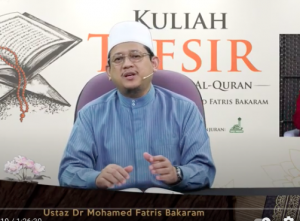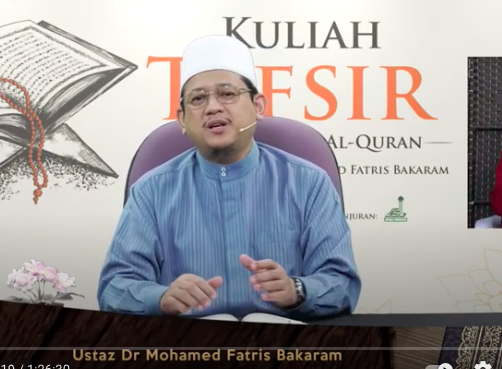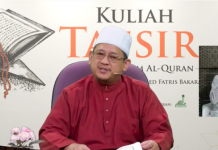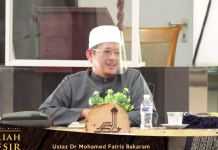بسم الله الرحمن الرحيم
Bismi-llāhi r-raḥmāni r-raḥīm
In the name of Allah, Most Gracious, Most Merciful
اللهم صلي على سيدنا محمد وعلى اله وصحبه وسلم
Allahumma salli ala Sayyidina Muhammad wa ala alihi wa sahbihi wasallim
O Allah, send your peace and blessings upon our Master Muhammad and upon his family and companions
The Stories and Lessons behind Surah An-Nur (Verses 11 to 14)
This article is a summary of takeaways from Ustaz Dr Mohamed Fatris Bakaram’s Tafsir Online Lecture on 17th January 2021. This lecture was a continuation of the stories behind Surah An-Nur verses 11 onwards. Translations of the previous lectures can be found here: 3rd January lecture (Part I) and 10th January lecture (Part 2). Summaries of previous lectures on Surah Maryam, Surah Taha, Surah Al-Anbiya’, Surah Al-Hajj and Surah Al-Mu’minun can be found here.
Recap of the Previous Lecture
In the past 2 lectures, we have been learning about the incidents that followed the battle of Banu Al-Mustaliq. We learnt about Al-Ifk, the incident in which Sayidatina Aisyah RA was slandered. Following the revelation of verses declaring her innocence, three companions from amongst the believers had been punished for the crime of Qazaf (accusing someone of adultery without bearing four witnesses).
Each of them was given 80 strokes of the whip. The three companions who were punished were: (1) Mistah bin Uthaathah, the son of Sayidina Abu Bakar’s cousin, (2) Hassan bin Thabit, a famous poet, and (3) Hemnah binte Jahsy, Rasulullah SAW’s sister-in-law.
Why Was Abdullah Bin Ubayy Not Punished?
We also spoke about a fourth character, the initiator of the slander, leader of the hypocrites – his name was Abdullah bin Ubayy bin Salul. Unlike the three companions mentioned, most narrations state that he had not in fact been punished for Qazaf, even if he was the source of the slander. We raised the question last week about how this could be possible.
There are a few opinions given by the scholars in response to this question. One of it is from Ibn Qayyim Al-Jauziyah who says that there was no sufficient evidence to prosecute Abdullah bin Ubayy; he was a stealthy man. All narrations hold the consensus that it was he who first raised those suspicions and incited doubt about Aisyah RA’s fidelity.
However, he never once said outrightly that Aisyah RA had committed Zina with Safwan RA. In fact, he only sparked curiosity and suspicion by saying vague things such as “Oh, could something have happened between them?”.
In addition, he was strategic in spreading his gossip. Abdullah never spoke in public and when he would whisper the gossip to someone, he would choose only the people whom he knew would not reveal their sources; he ensured he would not be incriminated. He was subtle and silent in spreading gossip.
When the rumours began to spread, they eventually reached the ears of the three afore-mentioned companions. These companions were not people who would speak implicitly. They spoke openly in a straight manner, explicitly mentioning Sayidatina Aisyah’s name.
When people heard what was said by them, they could clearly make out an accusation of Zina, there was no doubt to it. So, when the verse was revealed to declare Aisyah RA’s innocence, Rasulullah SAW could proceed to implicate the people who had clearly wronged her. The whole of Madinah knew that these three companions had outrightly spread this false news.
Implicating Abdullah bin Ubayy was a whole other business. There was no clear evidence to state that he was wrong; he never explicitly made a Zina accusation against Aisyah RA. As such, Rasulullah SAW used that as a reason for not carrying out the Qazaf punishment on Abdullah bin Ubayy.
How Could Abdullah Bin Ubayy Still Be Considered A Companion?
If you remember in the last lecture, we talked about the conflict between a man from the Ansar and a man from the Muhajir. We spoke about how Abdullah bin Ubayy had started inciting dissatisfaction through spreading some comments about the situation.
When Umar RA had heard of what was being said, he had requested Rasulullah SAW’s permission to let him behead Abdullah bin Ubayy. What had been Rasulullah SAW’s response? He had stopped Umar saying that he did not want it to become known that Rasulullah SAW killed his own companions.
Why was Abdullah still considered a companion? He was clearly a hypocrite, someone who was an enemy of Islam, always out to cause conflict and spark disorder amongst the believers. The problem is that it was only revealed by Rasulullah SAW much later who Abdullah bin Ubayy bin Salul was.
At that point of time, the status of Abdullah as a hypocrite was not known. The very definition of a Munafiq (hypocrite) is someone who hides his disbelief. If he had been blatant and open about his disbelief, we would not be calling him Munafiq, we would be calling him a Kafir (disbeliever).
Since his disbelief was hidden, it was difficult to gather clear evidence to prove his guilt. It is not easy to determine what is in someone’s heart, only Allah SWT knows that. Only when Allah SWT has informed Rasulullah SAW will he SAW know the truth regarding someone’s internal state.
So, even if Rasulullah SAW knew about Abdullah bin Ubayy’s identity as a Munafiq, if it came to the point of him being accused as killing a believer, there would be no way for Rasulullah SAW to prove that he had not been a true believer.
Likewise, when it came to proving that it was Abdullah bin Ubayy bin Salul who had started the slander against Aisyah, there had been no clear evidence. The words “Aisyah committed Zina with Safwan” never came out of Abdullah’s lips. Only the three companions used such words.
Furthermore, when the word got to Rasulullah SAW that Abdullah bin Ubayy had been inciting discord amongst the Ansar against the Muhajirun, Abdullah himself had come to Rasulullah SAW to deny the claims. He claimed himself innocent.
Similarly, when it came to the Ifk incident, Abdullah refused to admit that he had anything to do with the slander. Someone who willingly admits his mistake and repents would not be called a Munafiq. Abdullah was not at all remorseful with what he had done, in fact, he did not see any wrong in his actions.
So, since there was no incriminating evidence against him, and he did not himself admit he had done wrong, there was no way to prove he was wrong. When it came to Mistah, Hassan and Hemnah, the three of them immediately repented upon hearing the verse of Aisyah’s innocence.
They admitted their mistake, sought forgiveness from Allah SWT and apologised to Rasulullah SAW. When they themselves had admitted their mistake, only then did Rasulullah SAW punish them.
Punishment in This World Vs. Punishment In The Hereafter
We will see in the verses later that Allah SWT has distinguished between two parties that play a part in this incident. The first party is someone who plays the biggest part in this slander; he is the source, the spark to the flame.
Allah SWT tells us that he will be punished severely in the Hellfire. So even if he escapes punishment in this world, his punishment in the Hereafter is guaranteed. He will be recompensed for the sin he committed.
The second party, the ones who had committed a sin, admitted their fault, made repentance, and sought forgiveness… for these believers, they have undergone punishment in this world with hearts full of remorse and regret. The worldly punishment they have received will become the reason for Allah SWT to protect them from punishment in the Hereafter.
For any believer who commits a crime and is prosecuted for his crime in this world, for as long as he has remorse in his heart and strives to make amends, both with the people he has wronged and by seeking repentance from Allah SWT, then as soon as his punishment in this world is complete, Allah SWT will not punish him again or will lighten his punishment in the Hereafter.
On the other hand, for the Munafiq like Abdullah bin Ubayy, Allah will never relieve them of punishment in the Hereafter. Whether or not they go through punishment in this world, the intensity of the punishment in the Hereafter will not be reduced.
We need to remember this: The aim of punishment in Islam is neither for revenge nor to make someone pay for their crimes. If the aim of punishment was to release pent up anger, hatred and frustration, then there would be no rules governing the Hudud penalties. When comparing the amount of hurt and anger one has against the “fire starter” and those who merely “fanned the fire”, towards whom would we have more anger and hatred?
Clearly the source. But punishment is not about getting even, the intent of punishment is to educate and remind the public and to purify those who have committed sin. This is so that they may feel remorse over what they have done when they have undergone the pain of the punishment, so that they may repent and seek protection from Allah SWT from the punishment from the Hellfire.
Remember how I mentioned previously that when there were companions who came to Rasulullah SAW saying that they had committed Zina, Rasulullah did not dig further and ask for more details. In fact, he refused to hear any of it.
Only when the perpetrator insisted on getting punishment did Rasulullah SAW try to judge fairly. Even so, he tried to make excuses for the companion, questioning him if he was sure of what had been done, if he had not been mistaken. Rasulullah tried his best to avoid punishing him. Islam does not enforce punishment for the sake of revenge.
What Did Happen to Abdullah Bin Ubayy?
What is interesting is that even though Abdullah bin Ubayy was not punished with the Qazaf penalty, there were impacts of the incident upon Abdullah within the community. It is stated within the historical narrations that after that incident, the people of Madinah became clear of who Abdullah bin Ubayy really was.
From that moment onwards, whenever Abdullah would start to say something or attempt to spread any form of falsehood, his own community would be the first to stop him. Even those whose faith were shaky, even those who were hypocrites like him… even they would speak out against him. They called him a liar, saying that whatever that comes out from his mouth is false. Abdullah bin Salul had lost his credibility in the eyes of the people of Madinah.
There was a time later when Rasulullah SAW talked to Umar RA saying, “O Umar, do you see what had happened? If we had in fact killed Abdullah back when you wanted to, or even during the Ifk incident, what would have happened? Instead, this is what happened.”. Sayidina Umar RA understood what was being said.
If Abdullah had been killed earlier on, people would have accused Rasulullah of acting rashly. People may have even pitied and defended him. Instead, out of the strategic wisdom of Rasulullah SAW, Abdullah had been spared. At the end of the day, his own faults became known to the majority. Even his followers no longer believed him.
Prophet Muhammad SAW was a Nabi and a Rasul. Amongst the characteristics of a Prophet are four: Shidiq, Amanah, Tabligh, and Fathonah. What does Fathonah mean? It means intelligence, having a sharp mind.
Rasulullah SAW was Sayyidul Anbiya’i wal Mursalin (the leader of all prophets and messengers), surely the value of Fathonah was intrinsic to him SAW. This incident was just one proof of that.
May Allah SWT purify our hearts, strengthen our iman and eliminate from us the characteristics of a Munafiq. Rasulullah SAW has taught us this du’a to recite when we are making Istinja’, when doing purification after relieving ourselves:
اللَّهُمَّ طَهِّرْ قَلْبِي مِنْ النِّفَاقِ وَحَصِّنْ فَرْجِي مِنْ الْفَوَاحِشْ
Allahumma thahhir qalbi minan nifaq wa hasshin farji minal fawahisy.
O Allah! Purify my heart of hypocrisy, and my private parts from whatever is despicable and disdainful.
We ask Allah that He protects us from our desires, such that we do not do the despicable because we are unable to control our desires and give in to the temptations of our private parts.
We ask for protection from hypocrisy because regardless of how much a hypocrite can hide, the truth will eventually come to light, if not in this world, then in the next where it will be showcased for all to see.
Verses of Surah An-Nur Explained
Hypocrisy Amongst Us
إِنَّ ٱلَّذِينَ جَآءُو بِٱلْإِفْكِ عُصْبَةٌۭ مِّنكُمْ ۚ
Verily! Those who brought forth al-Ifk (the slander) are a group among you… [24:11]
We mentioned previously that Al-Ifk refers to falsehood that is brought about with the intention of debasing someone. Scholars say that this verse was revealed either 30 or 50 days after the slander first started spreading.
The first thing that was revealed regarding this incident was that the slander has been spread from within yourselves. The falsehood did not come from foreigners outside of Madinah. They were spread by people amongst them.
This is why we ask Allah for protection from hypocrisy. If we are not careful, even as believers, we may find the characteristics and signs of Munafiq. May Allah protect us.
What Has Happened Is Good for You
لَا تَحْسَبُوهُ شَرًّۭا لَّكُم ۖ بَلْ هُوَ خَيْرٌۭ لَّكُمْ ۚ
… Do not think this is bad for you. Rather, it is good for you… [24:11]
How can it be good for us? This slander has caused chaos amongst the believers and disrupted the household of Rasulullah SAW. This was a huge crisis in the life of Rasulullah SAW. Imagine if it had happened to you, as a husband! Could you imagine the humiliation that must have been, facing your friends, your neighbours, and the community?
And this was not any man, it was Rasulullah SAW, the judge of all conflicts amongst the Muslims, the teacher of the community. He was the Imam, the leader of the leaders in the community. Imagine how that must have been for him.
Imagine the pain it must have brought to the family and friends of Rasulullah SAW, seeing him like that. Imagine the pain that Sayidatina Aisyah RA must have experienced, to the point that we heard about her crying and refusing to look at her beloved husband.
This is a reminder for us that regardless of whatever happens in life, we need to hold firmly to our moral values. As believers we cannot just easily get swept away by anxiety, worry, and hopelessness.
Allah SWT is teaching us that regardless of what happens, no matter how painful things may be for us, we need to look closely. What is the wisdom behind what has happened? What lessons are there to reap from this incident that we can hold onto for the rest of our lives?
I am not saying that we live life acting like nothing bothers us. “Oh, yeah I’m ok. He did some nasty things to me, but life is good. I’m fine.” No, this is not what I am saying. If this was what we were meant to learn, then Rasulullah SAW would not have carried out the Qazaf penalty.
He would not have punished the three companions, two of whom were his own family members. Allah SWT is teaching us to be strong, to keep moving forward, even when all odds seem to be against you and the weight of the mountains seem to be upon you.
Perhaps there might be some amongst us who have experienced hardships that are equally painful. If not, perhaps some of us might encounter such situations in the future. Even for me, such experiences may affect any of us at any time. Perhaps it could be out of our own faults or of the fault of others towards us.
Remember this, as believers, you will always be tested. At times, the test comes out of your own mistakes and faults. Other times, Allah SWT has arranged for the tests will come to use via other people.
As believers, we cannot just give up, raising our arms in helplessness saying, “Ah, such is life – always so unfair towards me!”, “Why is God so cruel to me?”, “Oh, I have such bad luck!”. Make Istighfar, seek forgiveness and aid from Allah SWT. Ask for peace of mind and heart. Then have a look to see what lessons there are for you to learn.
Now you see, that this incident brings with it a lot of goodness. First, is that the truth has become known about Abdullah bin Ubayy. It is such that even his own companions refused to trust his word anymore. Subhan Allah!
Watch Your Tongue
Second, is a lesson for the companions of Rasulullah SAW that would later become a lesson for all of us today as the Ummah of Rasulullah SAW. The lesson for us is to watch your tongue. Watch your tongue. Watch your tongue!
When you do not hold your tongue, you become the cause of ruin for someone else’s relationship with their spouse. We cause someone to lose their dignity. This is what happens when we are not careful.
In the time of Rasulullah SAW, the three companions made a mistake. They were reprimanded by Allah SWT and could seek forgiveness from Rasulullah SAW and Aisyah RA. They had enough time to make amends, to say Istighfar, and to repent.
After they have been punished, they turned over a new leaf and were not caught again causing trouble. They will be amongst those who enter Paradise InshaaAllah. Today, if we were to make the same mistakes, is there a guarantee that we will be able to make amends before it is too late for us?
Before we are invited to return to Allah SWT? Will we be able to get punished with Qazaf in this world and become purified before we die and meet our punishment in the hereafter instead? There is no guarantee of our safety today.
So, do not be quick to jump on the bandwagon and follow the trends of badmouthing people. Do not blindly echo whatever you hear is being said by others. Guard your tongue. This guarding of the tongue is not restricted to only the accusation of Zina upon others. This is the worst of falsehoods to spread; therefore, there is a Qazaf punishment of 80 strokes for the perpetrators of this sin.
However, even if there is no Hudud penalty to be given to gossip of other kinds, the sin of slander and gossip, lying about or debasing someone else… these are huge sins in the sight of Allah SWT. Allah SWT let this incident happen as a reminder for us.
As someone listening to this story, we should feel impacted by it. Be careful and guard your tongue. Be careful and watch your words. Today, we may view the tongue lightly, but poison seeps out from our fingertips. Be careful of what you say. Allah SWT tells us that regardless of what happens, there are lessons to take away from any incident in life. It is up to us to learn them and put them in practice in life.
How Do You Respond to Being Confronted With Your Sin?
لِكُلِّ ٱمْرِئٍۢ مِّنْهُم مَّا ٱكْتَسَبَ مِنَ ٱلْإِثْمِ ۚ وَٱلَّذِى تَوَلَّىٰ كِبْرَهُۥ مِنْهُمْ لَهُۥ عَذَابٌ عَظِيمٌۭ
… Unto every man among them will be paid that which he had earned of the sin, and as for him among them who had the greater share therein, his will be a great torment. [24:11]
The three companions have received their share of punishment in this world. For Abdullah bin Ubayy, a great torment has been guaranteed and prepared. Where is this great torment? It is in the Hereafter. Those who have faith, when being confronted with their mistake will admit their faults and make amends. Those who do not have faith will do otherwise. This is what differentiates the mistake of Iblis and the mistake of Adam AS.
Iblis, when confronted and asked why he would not bow to Adam, retorted saying that he could not possibly bow down to someone who was inferior to him. When his punishment of being banished from Paradise and sent to Hellfire was announced, he said to Allah, “Don’t do this yet; give me some time.
I want to mislead the children of Adam and get them to enter Hellfire with me.” He did not ask for an extension so he could repent for his sins. That was his mistake and that was his attitude when being confronted with his mistake.
Prophet Adam AS, when confronted about his eating the fruit of the forbidden tree, immediately remembered his place. He took ownership of his carelessness and remembered Allah SWT. He made du’a making sincere repentance and begging for forgiveness from Allah SWT. This is how a believer should act.
The Believers Are One Body
لَّوْلَآ إِذْ سَمِعْتُمُوهُ ظَنَّ ٱلْمُؤْمِنُونَ وَٱلْمُؤْمِنَـٰتُ بِأَنفُسِهِمْ خَيْرًۭا
Why then, did not the believers, men and women, when you heard it (the slander) think good of themselves… [24:12]
Why did Allah SWT use the phrase “think good of themselves”? There was no mention of other people during the incident of the slander. The only one who had been badly slandered was Sayidatina Aisyah RA. The word ‘themselves’ was used because the believing people, regardless of who we are and where we come from, are like one body. In hadith, Rasulullah SAW tells us:
تَرَى الْمُؤْمِنِينَ فِي تَرَاحُمِهِمْ وَتَوَادِّهِمْ وَتَعَاطُفِهِمْ كَمَثَلِ الْجَسَدِ إِذَا اشْتَكَى عُضْوًا تَدَاعَى لَهُ سَائِرُ جَسَدِهِ بِالسَّهَرِ وَالْحُمَّى
“You see the believers as regards their being merciful among themselves and showing love among themselves and being kind, resembling one body, so that, if any part of the body is not well then the whole body shares the sleeplessness (insomnia) and fever with it.” [Bukhari]
Think about it, when someone has a toothache, it is not just the tooth that hurts. The whole body gets a fever. This is the metaphor given to describe the Muslims – we are one body.
In our interactions between ourselves, we need to remember that we are Muslim and so are they. Both of us have said the Shahadah, both of us have accepted Rasulullah SAW as our Messenger. We are no different from one another. There is no “us” and “them”.
The moment this segregation is done between one group to another, then we no longer feel bad about badmouthing the other group. We no longer feel bad about debasing other people, tarnishing their honour and dignity. As Muslims, we are one body. When we criticise someone else, it is as though we are criticising ourselves.
When we speak badly of others, if what we are saying is true, then it is a big sin – it is called gossiping. If what we are saying is false, then it is an even bigger sin – it is called slander, spreading falsehood. If there is a bond between hearts and we see our fellow Muslims as our brothers and sisters, then you are a part of us, and we are a part of them.
We are one. Is there anyone who would slap himself? Is there anyone who would knock her own head? There is nobody who would hurt, mock or criticise himself. This is why Allah SWT uses the word “bi anfusihim” here, meaning ‘themselves’.
My brothers and sisters, would it be possible for us as a community to shift our mindset? To view others as part of ourselves? This is what I do and I encourage you all to do. Evoke in yourselves the feeling of love and compassion towards one another. What will help this feeling to flourish is when we say it out. Make it a habit for you to express your love.
When you meet your friend, say to him, “Eh Mat, I have known you for so long and I have not said this to you. I want you to know that I love you.”. Your friend might respond asking, “What is the matter with you? I have goosebumps now that you’re talking like this!”.
We are not referring to romantic love. We are talking about love stemming from faith, from brotherhood (Ukhuwwah). When we say it aloud, it will help us, bit by bit, to spark that affection and compassion within our hearts for our brothers and sisters, even if it may not yet be in existence right now.
It is true that this is the problem with human beings, we tend to be suspicious of one another. We think poorly of others and entertain nonsensical thoughts of people. We look at people and we think badly of them. We look at their families and we see their flaws.
We hear a bit about them, and we start thinking all kinds of nonsense. Train yourselves to start seeing others as part of yourselves. You are part of me. And we are in this together as a single being – as the Ummah of Rasulullah SAW.
Reject Any Rumours Immediately
وَقَالُوا۟ هَـٰذَآ إِفْكٌۭ مُّبِينٌۭ
… and say, “This is an obvious falsehood”? [24:12]
This should have been our stand and the stand of the companions of Rasulullah SAW. Whenever nonsensical news come to us, we should immediately reject what was said. Unless we have been entrusted to investigate into the incident – for example if it is our job to judge and act – otherwise, we have no need to probe further.
In our lives within the community, regardless of what the mistakes may be that is spoken about, it has nothing to do with us and will not affect us in any way. Whether this piece of news is the truth, or it is false, knowing it does not in any way affect our lives. So, the moment the news reaches you, leave it.
This verse teaches us to treat the news as a lie. Why must we carry on having this suspicion? Why should we perk our ears to hear what is being said? Why should we let ourselves be influenced by what we hear, such that we end up being a mouthpiece and spreading the news further?
Do not get involved, my brothers and sisters. It is a matter between them and Allah. Their family issues are to be dealt with by them with Allah. If they ask for advice, then advise them directly, do not share their story out there in Facebook to everyone. This is not what is being taught by Rasulullah SAW.
The Companions Who Stood Firm Against Falsehood
There are some scholars who say that this part of the verse was directed at the companions of the Prophet SAW who were the first to hear of this news and held a strong firm stance not to listen to or entertain these words at all.
They did not want to have anything to do with these rumours. They rejected the rumours strongly. Who were these people? Amongst them were people we have mentioned in the last two lectures:
(1) Usamah bin Zaid (the beloved son of the beloved). When questioned by Rasulullah SAW regarding Aisyah, he said, “I only know of Aisyah RA as someone who is good. She would never do something like this. This is clearly and outward lie.” He completely removed Aisyah from these wild rumours.
(2) Zainab binte Jahsy (the sister of Hemnah binte Jahsy RA and wife of Rasulullah SAW). She was known to have a sort of rivalry with Aisyah RA, always competing with one another and being jealous of one another. Yet when she was questioned by Rasulullah SAW, she said, “I only know of Aisyah RA as someone who is noble and honourable.” She did not even have the slightest doubt that she could be mistaken.
(3) Burairah (the servant of Aisyah RA). She was recommended by Usamah bin Zaid as being the closest person to Aisyah RA. When asked by Rasulullah SAW about her, Burairah said, “Aisyah is an honourable woman. Her only flaw is that she is too young, sometimes she becomes a victim to what people say of her.” She was firm in her stance.
If we read further into the tafsir of this verse, some scholars say that this verse was specifically revealed to this companion called Abu Ayyub Al-Ansari and his wife. When this hot news came to Madinah, Abu Ayyub asked his wife, “My dear wife, did you hear about what people are saying about Aisyah RA?”.
His wife responded, “I have heard, but I do not believe it!”. Abu Ayyub then continued, “If it were to be me, would you do something like that to me?”. His wife responded, “I am nowhere near as honourable as Aisyah, and yet I would never once be unfaithful towards you.
How could Aisyah be unfaithful? And you are nowhere as honourable as Rasulullah SAW, and yet I would never be unfaithful to you. How can we then say that the wife of Prophet Muhammad SAW could be unfaithful to him?” This is what our stance should be as believers, standing firm in defending our fellow brothers and sisters from falsehood and gossip.
Three Responses to the Falsehood
لَّوْلَا جَآءُو عَلَيْهِ بِأَرْبَعَةِ شُهَدَآءَ ۚ فَإِذْ لَمْ يَأْتُوا۟ بِٱلشُّهَدَآءِ فَأُو۟لَـٰٓئِكَ عِندَ ٱللَّهِ هُمُ ٱلْكَـٰذِبُونَ
Why did they [who slandered] not produce for it four witnesses? And when they do not produce the witnesses, then it is they, in the sight of Allah, who are the liars. [24:13]
There were different groups of people involved in this trial. The first were a group of firm rejectors of the rumours. They refused to entertain any word of the slander, saying that for as long as there are no four witnesses, Aisyah is innocent.
The second group made up the bulk of the majority. They did not believe the rumour, but neither did they reject it. They chose to wait and see what happens. To them, even though there was no evidence and there were not four witnesses, there was also no evidence to prove her innocence. There had been no revelation to clear her name for weeks. They did not spread the rumour, but they did not immediately reject it. They left it to Allah SWT.
The third group were those who spread the news further even though there had been no evidence. The reality is that as believers, they should have immediately rejected the news as falsehood as soon as they found out that there had been no witnesses. Unless and until someone brings clear incriminating evidence, or four witnesses are brought forth, or the accused themselves confess, they are considered innocent.
When Calamity Strikes and We are Tested
وَلَوْلَا فَضْلُ ٱللَّهِ عَلَيْكُمْ وَرَحْمَتُهُۥ فِى ٱلدُّنْيَا وَٱلْـَٔاخِرَةِ لَمَسَّكُمْ فِى مَآ أَفَضْتُمْ فِيهِ عَذَابٌ عَظِيمٌ
Had it not been for the grace of Allah upon you, and His mercy in this world and in the Hereafter, a severe punishment would have reached you for what you indulged in [24:14]
There is a lesson for us in this. In the time of the Prophet SAW, when people made mistakes, there would be revelation sent down and they would have the opportunity to repent.
Today, we do not get such an opportunity. What do we do? Do we wait for the punishment to come before we start repenting? Do we wait for calamity to strike before we feel remorse and regret?
I am not saying that we should link whatever calamity that befalls us to a certain deed that was done. Do not be too quick to put the blame on something or someone. Allah SWT is the one who sent down the trials, He has His reasons. Who are we to decide what His reasons were on His behalf? Are we Allah SWT’s ambassadors and spokespeople?
Whatever the trials may be that befall us, use it as an opportunity to reflect and see where we can reflect and make amends. Where is it possible to improve ourselves? What mistakes and faults have we done as Allah SWT’s servants?
This is so that we can get closer to Allah SWT, to become more worthy of His Love and Compassion. Allah SWT tells us in this verse that if it were not for Allah’s Love and Mercy, Madinah would have been struck by calamity. Let us take this as a reminder for us all.
May Allah protect us all. Crisis has once struck Madinah, and crises will continue to strike the believing people. Have a positive outlook in life. Guard the unity and strength of one another. Regardless of who we may be, our fellow believers are in fact a part of us. We are a single body.
Moving forward, try not to be amongst the people who, when tested, pretend not to understand or not to care. We want to reflect, inspect and to take heed from the lessons that Allah brings to us.
When we are tested with a trial, we pray and hope that Allah removes the infliction upon us. Perhaps Allah SWT may remove the trial after a while. But when the trials have been lifted, do not think that after that there will no longer be any trials and tests.
Tests and challenges will never cease. At times, the trials may be huge and hit many people at once. Other times they may be small, and we will feel the stinging alone. Sometimes the trials are visible, Allah SWT tests us with pain in our physical body, in our lives, and our wealth.
At times Allah SWT tests us in a manner that is hidden – in our hearts, with our feelings, in our thoughts – these tests can also occur. We surrender ourselves to Allah SWT, in the hopes that Allah SWT protects and preserves us.
Closing Du’a
O Allah, we seek protection from you. Do not remove from us the blessings that you have showered upon us. Do not inflict us with Your Displeasure, Your Hatred, or Your Wrath.
Protect us from the harms of this world and the Hereafter. O Allah, we ask You for Your Redha, Rahmah, Compassion and Forgiveness in this world and in the hereafter. O Allah, protect us and the people we love, our parents, the spouses that you have gifted to us, the children that you have blessed us with to beautify our lives.
O Allah, distance us in our lives, from prolonged suffering. O Allah, if you have determined for us pain that we need to face, then also grant us in our hearts strengthened Iman, so that we may get out of any trial as a servant that is closer to You ya Allah, and not as a servant that has been cast far away from Your Love.
O Allah, grant us goodness in this world and the next. O Allah, protect us in this world and in the Hereafter. Protect us from ever coming close to the punishment of the Hellfire, Ya Hannaan, Ya Mannan, Ya Badii’us-Samawaati wal-Ardh, Ya Zhal Jazlaali wal Ikram, Ya Arhamar Raahimin. Wasalallahu ‘alaa sayyidina Muhammad wa ‘alaa alihi wa sahbihi wa sallim. Ameen.
Until we meet again next week, Allah SWT bears witness that I love all of you for the sake of Allah. May Allah SWT bless and honour our companionship for His sake. Ameen. Assalamu’alaikum warahmatullahi wa barakatuh.
Summary by: Arina Adom
Arina Adom is a lover of learning who takes on the world with an open mind. Resourceful and adaptable, always ready to take on new challenges. Comfortable working with diverse groups of people, yet able to work independently. Thrives under pressure. Currently seeking a meaningful career that enables her to impact lives directly and bring about positive changes in the lives of others in the community.
Arina graduated with a degree in Science ( Hons ), Life Science from NUS. She is currently taking a diploma in Quran and Sunnah Studies from Al Zuhri.
Watch Kuliah Tafsir again at
Masjid Darul Makmur’s Youtube
Watch and follow Kuliah Tafsir weekly
every Sunday after solat Maghrib

organised by Masjid Darul Makmur
Your contributions are appreciated. Get more details by clicking the image below.











